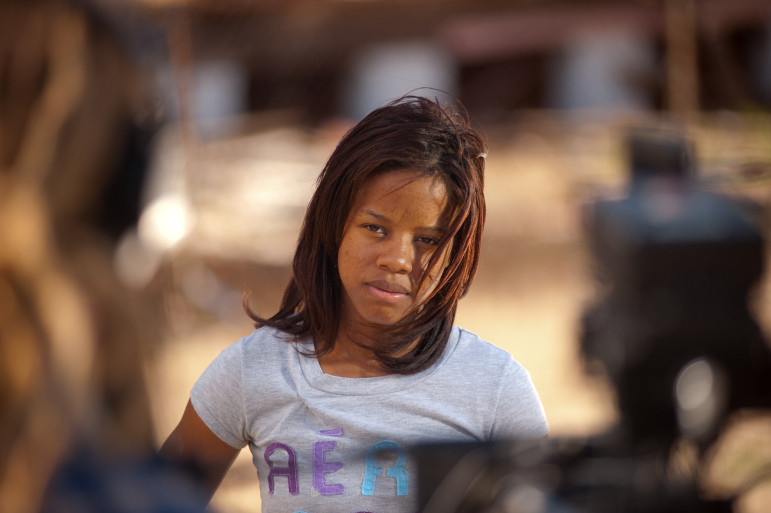
John Richie
A scene from documentary filmmaker John Richie's second feature-length film, "91%: A Documentary About Guns in America."
“What we need is another Jim Brady, who has the skill and the ability to convince those who are afraid who walk the halls of Congress to step up and do what they know is right. One will come along. It will happen. I pray God it is sooner rather than later.”
—Vice President Joe Biden at the memorial service for Jim Brady. Biden led an effort in the wake of the Newtown, Conn., massacre to expand the gun law requiring background checks passed in Brady’s name. He failed.
NEW YORK — The filmmaker could not get the number out of his head. Even while he was traveling the country to discuss “Shell Shocked” — a movie about children killing children with machine guns in the streets of his hometown New Orleans — it was a number that kept John Richie up at night.
After a classroom of children were found in a lifeless pile, shot to death by Adam Lanza in Sandy Hook, Conn., with an assortment of guns including a Bushmaster semiautomatic rifle, the country was awash in research and polling and charts about Americans and their guns.
One poll from Quinnipiac University that emerged from the soul-searching statistical cacophony was that 91 percent of the country supported closing what is commonly known as the gun show loophole.
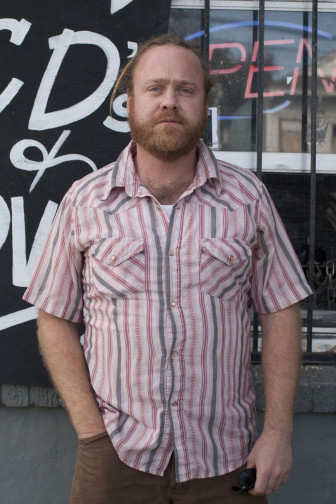
John Richie.
The loophole allows buyers to avoid background checks by buying guns at a show instead of a store. Richie, 37, who is familiar with the volatile third-rail politics surrounding guns and gun legislation, was taken aback by that number. Ninety-one percent. But that staggering support did not translate into law.
He could not reconcile that public policy paradox. How, he thought, could a measure with that stunning an amount of consensus around an issue as notoriously controversial as gun control fail to pass in Washington? How could it not even muster enough votes to get to the floor for a vote? In the wake of the Newtown shooting, no less? If that wasn’t going to stir Congress’ conscience, what would?
Those thoughts blossomed into Richie’s second feature-length documentary, “91%: A Documentary About Guns in America.” He recently surpassed his Kickstarter goal for the film and received a social media plug from gonzo documentary-maker Morgan Spurlock.
Richie wants to yank the strident debate over guns and gun law reform away from experts and policy wonks and let the country hear the stories of regular people whose lives were transformed by a gun, he said.
“I thought we missed a great opportunity to fix this problem,” he said.
Now he’s going to take another crack at it. He said he wants his movie to dispel the confusion that clouds the gun debate.
“I’m trying to move away from the extremes and try to return the conversation to a sensible middle,” Richie said. “No one wants to ban guns outright. People do in fact want sensible gun laws. This is about public health and not about the Second Amendment. We can’t afford to continue to not pass legislation because of the influence of special interests groups.”
Richie is not an urbanite out of central casting who reflexively sees guns as an unqualified evil. He owns a gun. He grew up around guns in north Louisiana. He went hunting for the first time in the tiny town of Chatham, La., when he was 12 with his uncle. They were looking for squirrels. Later on it was deer and ducks.
“I have a 16-gauge shotgun,” he said. “It was a recreational thing, a social thing. It was something you did with family and your buddies.”
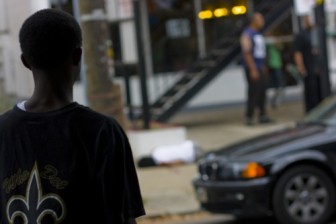
"Shell Shocked"
Richie was inspired to make his first film “Shell Shocked” when he saw children in his neighborhood suffering from drug violence. He toured the country with “Shell Shocked,” screening it in areas wracked by gun violence like the Bronx, using it as a touchstone for discussions about violence and how to curb it.
He kept hearing stories about how guns transformed people’s lives — dead children, dead parents, lingering injuries, depression.
“When I visited all these communities I kept hearing all these stories about personal loss,” he said. “There’s no way you can hear all these stories and not get upset and try to do something. Especially when you can see a way out of this. We can fix this problem.”
Often, he said, the problem is made out to be more intractable than it actually is by the media, who feature diametrically opposed talking heads.
”People just need to get educated and press their legislators to do the right thing,” Richie said. “That’s the goal of this film.”
 People fixate on the riveting large-scale massacres like Columbine or Newtown, but never hear about the workaday tragedies that shootings leave in their wake, he said. After the funerals, people’s lives grind on, he said. And it is often difficult to see.
People fixate on the riveting large-scale massacres like Columbine or Newtown, but never hear about the workaday tragedies that shootings leave in their wake, he said. After the funerals, people’s lives grind on, he said. And it is often difficult to see.
In Salt Lake City, Richie spent time with Carolyn Tuft. Tuft and her 15-year-old daughter Kirsten Hinckley were shopping at the popular Trolley Square Mall in February 2007 when Sulejman Talovic went on a killing spree. Talovic was killed by an off-duty police officer, but not before he killed Hinckley and four others, and shot Tuft twice. Police still have no explanation for Talovic’s motive.
Before the shooting Tuft was an active mother of mother of three. She bicycled 50 miles a day.
“They couldn’t remove all the shot,” he said, overcome with emotion.
When Richie met her recently she was only able to move four hours a day. She is slowly dying of blood poisoning from Talovic’s shotgun ammunition, he said. He is awed by her commitment to pushing for change.
For Richie, Tuft’s story represents the way a regular person — not an advocate from a think tank or a lobbyist on K Street — can have their life turned upside down in ways that don’t come through in policy papers.
“Each one of these shootings changes many, many lives outside of losing somebody,” he said. “She’s lost her life in several different ways.”
Richie met Tuft in Washington, D.C., when she was lobbying her senators, Orrin Hatch and Mike Lee.
“She showed me pictures of her before the shooting, and you see this person who had a life, a great life too. … they went to the mall — anyone can relate to this — and in a moment a young disturbed man kills her daughter and shoots her as well for no reason.”
Tuft’s story is the one that gets lost in the discussion, Richie said. She represents one of the 100,000 people who survive gun violence but whose life is never the same.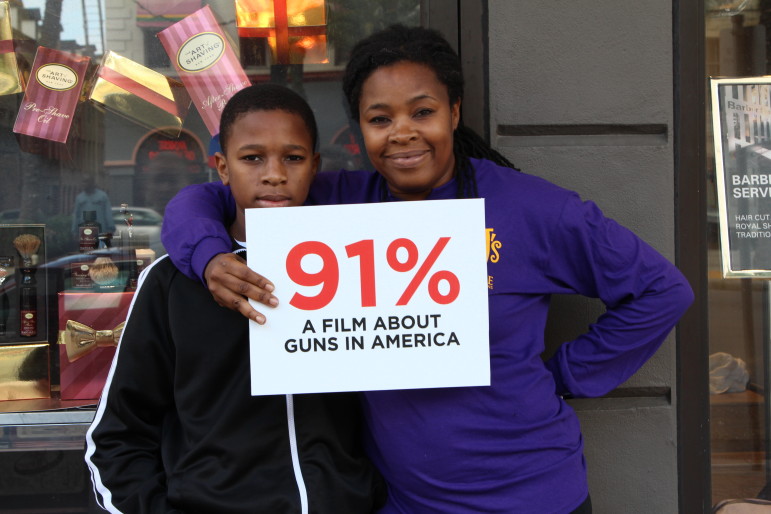
“We’re not focusing on the NRA or lobbyists or legislators,” he said. “We’re looking at real people and real consequences, and the grassroots people who have been touched by gun violence.”
Richie is preparing for several road trips: in the Northeast from Washington, D.C., to Baltimore, Philadelphia and New York City en route to Newtown. He has another trip west that will take him and his crew from Oregon through the Midwest and Texas back to his hometown of New Orleans.
“We’re going to talk to people in cities in every part of the country who have been touched by gun violence and see what they done with their tragedies and how they’ve turned these tragedies turned them into activists.”
When the film is finished Richie hope it leads to more than applause — he wants it to lead to action. “I’m hoping it lights a fire under the audience and it gets them out to the polls and gets them to force real changes on the federal level.
“If we do see changes 10 years from now and we’re looking at 3,000 homicides a year from gun violence a year instead of 30,000 then I‘ll think it was all worth it,” he said. “If we did pass the legislation after Newtown how many lives would’ve been saved already?”
After a moment of silence he added: “What are the alternatives?”
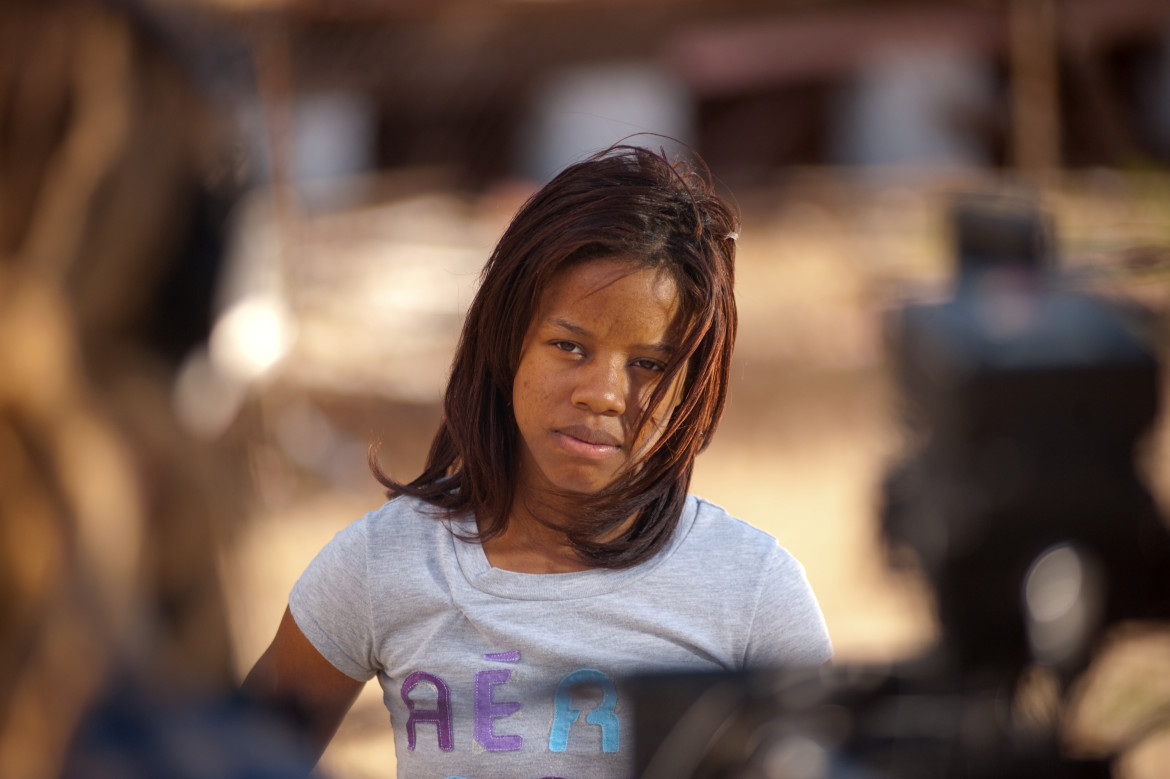
There is no gun show ‘ loophole’. FFL Dealers must perform background checks as they do in their stores. The histrionics about this center on private sales. But these can take place at yard sales or residences. Guns are private property.
You have wonder about how a ‘poll’ gets 91% for something that is a myth.